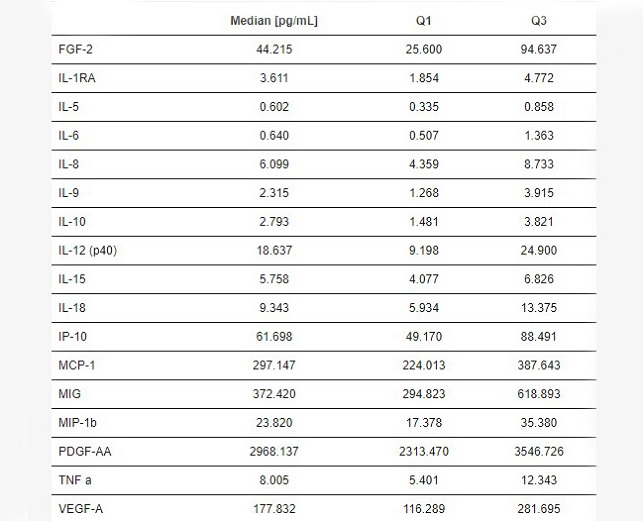Comprehensive Analysis Of Cytokine Levels And Their Potential Impact On Cardiovascular And Pulmonary Complications In Post-COVID-19 Patients
Nikhil Prasad Fact checked by:Thailand Medical News Team Feb 22, 2024 1 year, 10 months, 4 days, 21 hours, 8 minutes ago
COVID-19 News: The global COVID-19 pandemic has prompted extensive research into its aetiopathogenesis, risk factors, and complications. A recent study that is covered in this
COVID-19 News report, conducted at the Medical University of Silesia in Katowice, Poland, and the Silesian Centre for Heart Diseases-Poland, aimed to assess the levels of selected cytokines and their potential influence on the development of cardiovascular and pulmonary complications in patients who had been hospitalized after recovering from COVID-19. Understanding the cytokine profile in post-COVID-19 patients could provide insights into the long-term health implications of the disease.
 Concentrations of the cytokines analyzed for the entire study group.
Literature Review
Concentrations of the cytokines analyzed for the entire study group.
Literature Review
The available literature highlights the elevation of inflammatory biomarkers, especially cytokines, during the acute phase of COVID-19. These elevated levels have been associated with a more severe disease course and poorer treatment outcomes, sparking interest in the concept of a "cytokine storm." Beyond the acute phase, some patients experience persistent symptoms known as "long COVID," affecting multiple organ systems. Long-term complications, particularly fibrotic lesions in the lungs, have been observed, emphasizing the need for further research into post-COVID-19 health implications.
Objective
The primary objective of this study was to assess the levels of selected cytokines and explore their potential correlation with the development of cardiovascular and pulmonary complications in patients who had previously been hospitalized for COVID-19.
Methods
The study included 76 randomly selected patients from the SILCOVID-19 database. Cytokine assays were performed on serum samples using the Luminex100 platform with the Milliplex MAP kit from Merck KGaA Germany, covering a panel of 30 cytokines. The median time from symptom onset to the study visit was 102 days. Statistical analyses were conducted to examine the relationships between cytokine levels and various factors, including gender, age, comorbidities, and the presence of lung or cardiac abnormalities.
Results
The study revealed no statistically significant differences in most analyzed cytokines based on the presence or absence of lung lesions or cardiac abnormalities. However, high concentrations of specific cytokines, such as PDGF-AA, MCP-1, MIG, and VEGF-A, were identified. Interestingly, these cytokines have implications in the development of lung and cardiovascular diseases.
Discussion
While the study did not demonstrate direct associations between cytokine levels and cardiovascular or pulmonary complications in post-COVID-19 patients, the elevated concentrations of PDGF-AA, MCP-1, MIG, and VEGF-A are noteworthy. MCP-1, known for its role in cardiovascular diseases, and PDGF-AA, associated with fibrosis and airway inflammation, cou
ld signify potential long-term health risks in COVID-19 survivors. The study emphasizes the importance of continuous monitoring of cytokine levels and diagnostic imaging in this patient group to detect abnormalities early and administer appropriate therapy.
Analysis of Specific Cytokines
The study highlighted the elevated levels of MCP-1, a chemotactic protein involved in cardiovascular pathogenesis. MCP-1 induces monocyte migration, contributing to atherosclerotic plaque formation and plaque instability, potentially leading to ischemic events. PDGF-AA, implicated in fibrosis and airway remodeling, was also found at high concentrations. This growth factor's role in lung diseases, including asthma, raises concerns about its impact on post-COVID-19 respiratory health.
Similarly, VEGF-A, MIG, and IP-10 were identified at elevated levels. VEGF-A, recognized for its role in angiogenesis and often associated with cancer, has implications for lung development and function. MIG, an inflammatory chemokine, attracts T lymphocytes and NK cells, contributing to lung carcinogenesis. IP-10, a potential marker for lung diseases, has diagnostic utility in identifying COVID-19.
Conclusion
While no direct correlation between cytokine levels and cardiovascular or pulmonary complications in post-COVID-19 patients was established, the study highlights the significance of elevated concentrations of specific cytokines. The persistent high levels of PDGF-AA, MCP-1, MIG, and VEGF-A raise concerns about potential long-term health consequences in COVID-19 survivors. The identified cytokines play crucial roles in lung diseases and cardiovascular pathogenesis. Consequently, continuous monitoring of cytokine levels and diagnostic imaging is recommended for early detection of abnormalities and timely therapeutic intervention in this patient group. This research contributes valuable insights into the post-COVID-19 health landscape, laying the foundation for further studies on the long-term effects of the disease.
The study findings were published in the peer reviewed journal: Medicina.
https://www.mdpi.com/1648-9144/60/3/353
For the latest
COVID-19 News, keep on logging to Thailand Medical News.
